Updated and improved for 2025, the JetBoil Zip 0.8L remains a tried-and-true classic in the world of integrated stove systems – but with a few welcome upgrades that make it even more user-friendly. It’s still a no-frills backpacking stove: lightweight, compact and focused purely on the essentials of fast, efficient water boiling.
Powered by JetBoil’s signature FluxRing technology, the Zip now boils 500ml of water in as little as 120 seconds, making it ideal for quick coffees or rehydrating expedition meals without the wait.
New features for 2025 include a textured grip zone for easier handling, a redesigned pot-to-burner connection with three locking points and visual indicators for added security, and a more intuitive flame control valve with a position marker.
As ever, everything packs neatly into the 0.8L pot – which is wrapped in a cosy to keep your water hot and your hands burn-free – and the bottom cover doubles as a cup or bowl to save space in your pack. Simple, reliable and more refined than ever, the JetBoil Zip 0.8L continues to offer excellent value for solo adventurers.
Pros
- Incredibly quick boil times
- One of the lighter all-in-one systems
- Handy fabric sleeve
- Includes a 300ml plastic cup
Cons
- Only actually recommended for 500ml
- Rather limited to boiling water (or a little pasta)
| RRP: | £101.55/$99.95 |
| Boil time (0.5 litres): | 105 seconds (in our test) |
| Power output: | 1,500W (5,300 BTU/hr) |
| Burner diameter: | 4cm |
| Pan support diameter: | 9cm |
| Assembled height: | 28.5cm |
| Packed size (LxWxH): | 11x11x16.5cm |
| Weight: | 358g/1.34oz (including stove, pot, lid, fuel stabiliser and plastic cup) |
Construction
The Jetboil Zip 0.8L is a compact, integrated stove system designed with simplicity and efficiency in mind. It forgoes some of the bells and whistles seen on other over-engineered, higher-end models, and instead delivers simple, solid performance where it counts.
The burner screws directly onto the top of your gas canister, while a sturdy, tri-footed stabiliser base clips to the underside of the gas canister for added stability on uneven ground.
The 0.8L FluxRing pot slots neatly onto the burner with a satisfying twist-lock, creating a stable and unified setup. Jetboil’s signature FluxRing technology – a corrugated metal ring around the base of the pot – acts as a heat exchanger, capturing more heat from the burner and channelling it efficiently into the pot.
This design reduces fuel waste and speeds up boil times compared to basic canister-top stoves, where heat often escapes from the sides. The all-in-one design also protects the flame from the wind, encasing it all-around and helping to limit any performance reduction due to wind interference.
The valve dial is another nice touch in the 2025 update. Gone is the flimsy wire twist knob found on many backpacking stoves. In its place is a more solid, hardware-style dial that feels intuitive, well-built and – although long-term use will be the true test – likely more durable.
Simmer control is passable, but let’s be honest: the Zip isn’t about finesse. It’s about blitzing water to a boil as quickly as possible, no frills.
One small but important detail: while the pot technically has a capacity of 0.8L, the maximum recommended boil volume is just 500ml. There’s a subtle indented line inside the pot to mark this, and it's worth noting, as overfilling can lead to messy boil-overs.
Power output and boil times
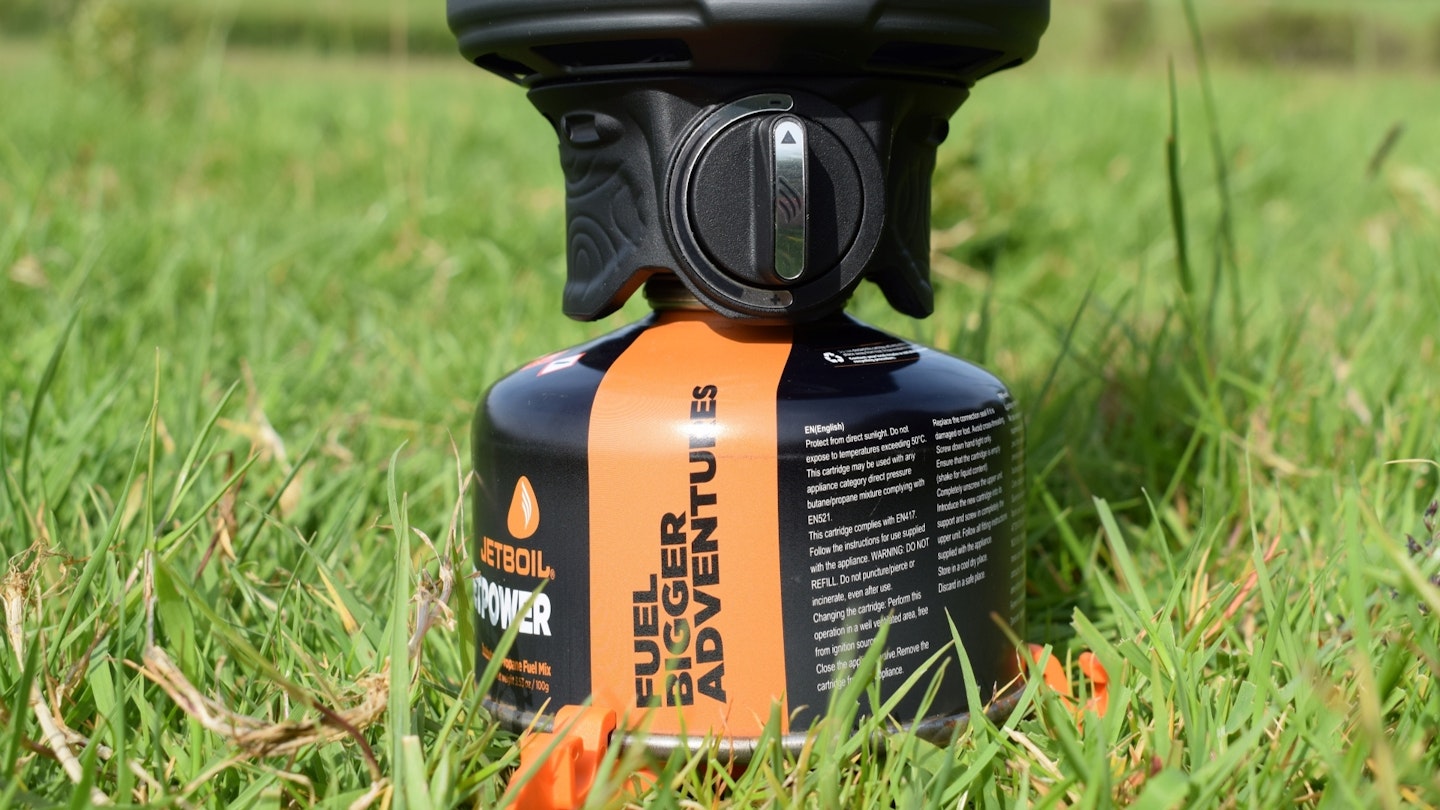
The 1,500W (5,300 BTU/hr) output delivers a quoted boil time of 120 seconds for 0.5 litres (the average boil time over the average life of a Jetboil gas canister, meaning you’ll get a faster boil than 120 seconds when the canister is full and brand new and a slower boil when the canister is running out).
All of this means the Zip is more than capable of handling backcountry brews and boil-in-the-bag dinners in rapid times, without burning through your gas supply.
I tested the Jetboil Zip’s boil times on a warm day in June, with a light breeze in the air. I filled the pot with 500ml of water at 18.3C, according to my food grade thermometer, and was using a brand new 230g JetBoil Jet Power gas canister.
I then cranked the stove up to max and started my stopwatch. The thermometer hit 100°C in exactly 1min 45secs, so 105 seconds – a rapid boil time by any measure and an impressive result. Indeed, the stove roared like a jet engine and the power of the stove was easy to both see and hear.
For comparison I performed a similar test with the Primus Lite+ system recently and it was about one minute slower, reaching 100°C in only 2mins 43secs.
The JetBoil Zip has a clear and simple focus: it’s designed to boil water quickly – and that’s about it. This pared-back approach makes it ideal for campers who just want to add hot water to expedition meal pouches like Summit To Eat or Firepot, and it’s perfect for morning brews or a warming hot chocolate at the end of the day.
It’ll just about stretch to instant noodles or a small pasta portion, but it’s not designed for elaborate cooking. If you’re dreaming of pan-fried steak or slow-simmered sauces, this isn’t the stove for you – you'd be better off with a fully-featured camping stove.
Weight and packability
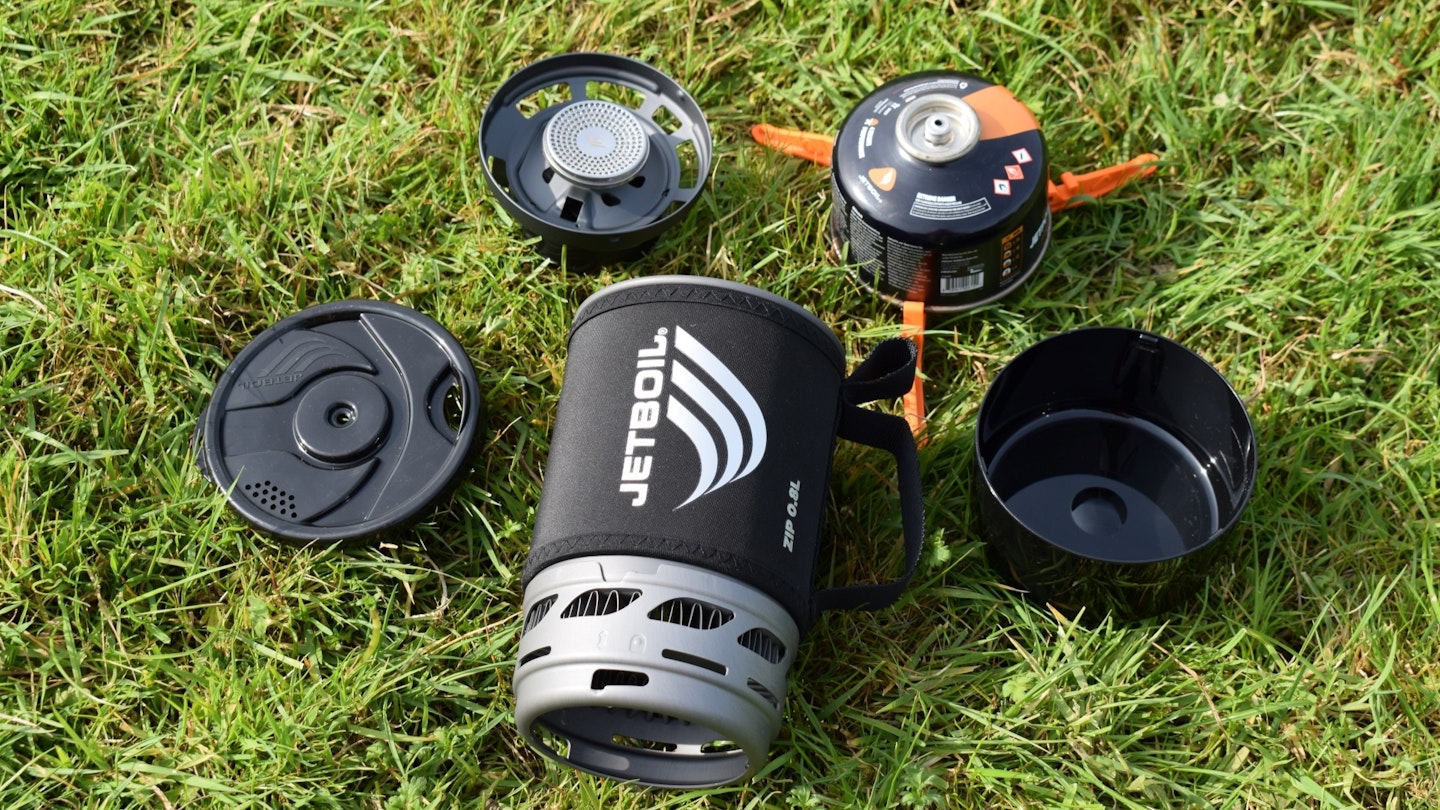
The JetBoil Zip 0.8L is an all-in-one integrated camping stove system – which, by design, means it's never going to win any ultralight awards. Compared to minimalist, canister-top stoves like the MSR PocketRocket Deluxe, this is definitely on the bulkier side. But that’s the trade-off you make for convenience and efficiency.
The whole setup – including the burner, 0.8L pot, lid, plastic measuring cup/bowl and fuel canister stabiliser – tips the scales at 358g. That’s actually lighter than several rivals in the integrated stove world: the Primus Lite+ comes in at 427g, and the JetBoil Flash is 426g, fully loaded. So, while the Zip isn’t featherlight, it is one of the lighter options in its class – a definite tick in its favour.
Of course, if you're a gram-counting thru-hiker or alpine minimalist, you'll probably still lean towards a simpler setup. For context, the MSR Pocket Rocket Deluxe weighs just 98g, and the SOTO Windmaster is even lighter at 97g – although neither of those include a pot, let alone an integrated system.
When it comes to packability, the Zip is pleasingly neat. Everything – including a 100g gas canister – nests inside the pot, creating a compact, self-contained unit that feels tidy and convenient. The packed dimensions are 11x11x16.5cm. That’s far from tiny, but it’s not outrageous either. It’ll take up a bit of space in your backpacking rucksack, sure, but for most campers it’s a fair trade-off given the functionality and ease-of-use you get in return.
Features
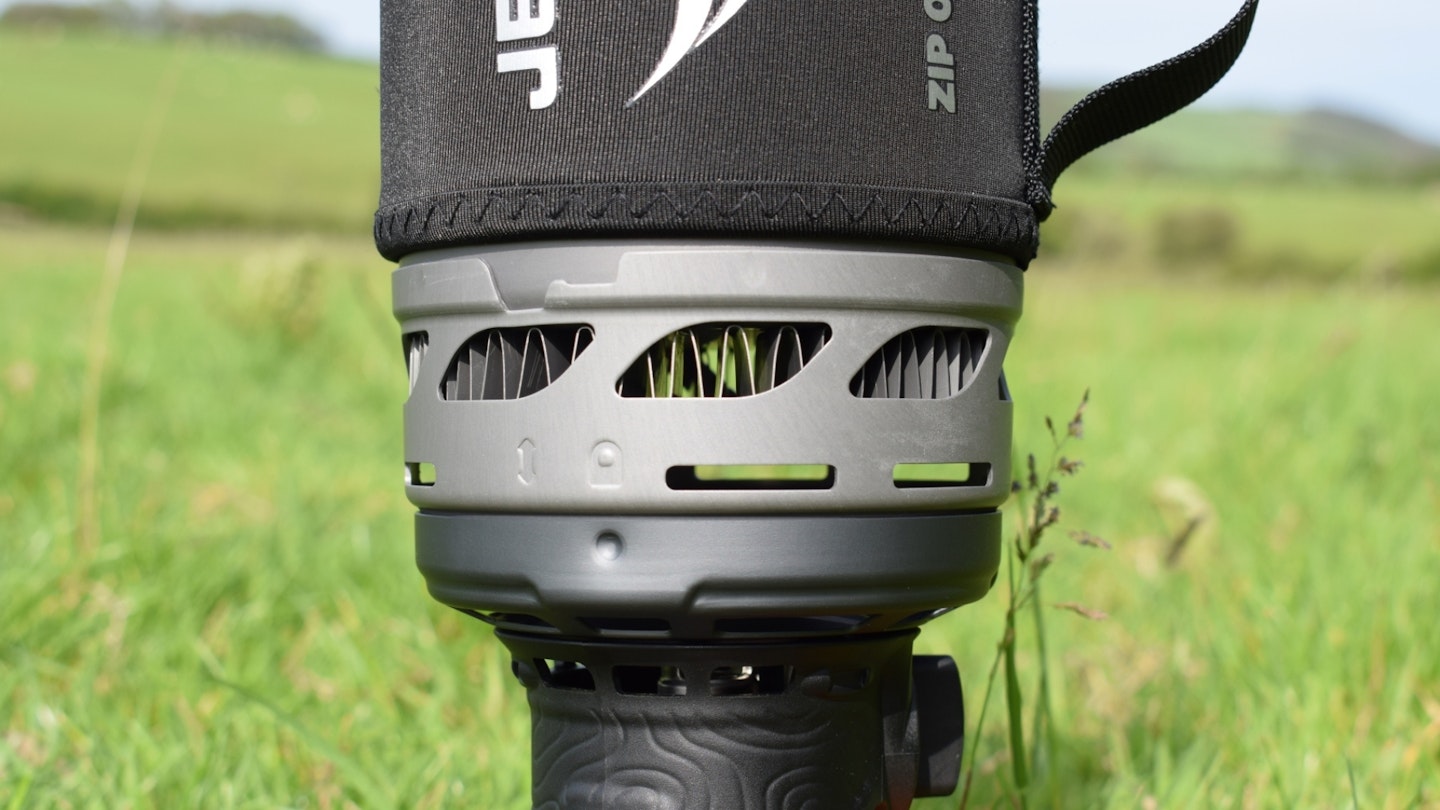
Let’s get the most divisive feature out of the way first: the JetBoil Zip doesn’t have a piezo igniter (a device that generates a spark to ignite a gas fuel). For some campers, this is a total deal-breaker – an omission that adds faff and frustration to your mealtime routine. For others, it’s a non-issue, or even a bonus.
Personally, I don’t mind it. Piezo igniters are certainly convenient, especially if you’re prone to forgetting your lighter or matches, but they’re also a common failure point in stove systems – a small, fragile bit of hardware that often gives up the ghost long before the stove itself does.
I always carry a lighter and matches anyway as a back-up (as you should, even with a piezo), so I figure you might as well just strike up from the start and remove one thing that can go wrong.
Beyond ignition, the Jetboil Zip comprises five main components: the burner (which we've covered above), the pot, the lid, the stabiliser and the plastic cup.
Starting with the lid – it’s made from a soft, flexible plastic that fits snugly over the pot. It features a coffee-cup-style drinking spout and a set of perforated holes for straining water when cooking pasta or noodles – simple, but smart.
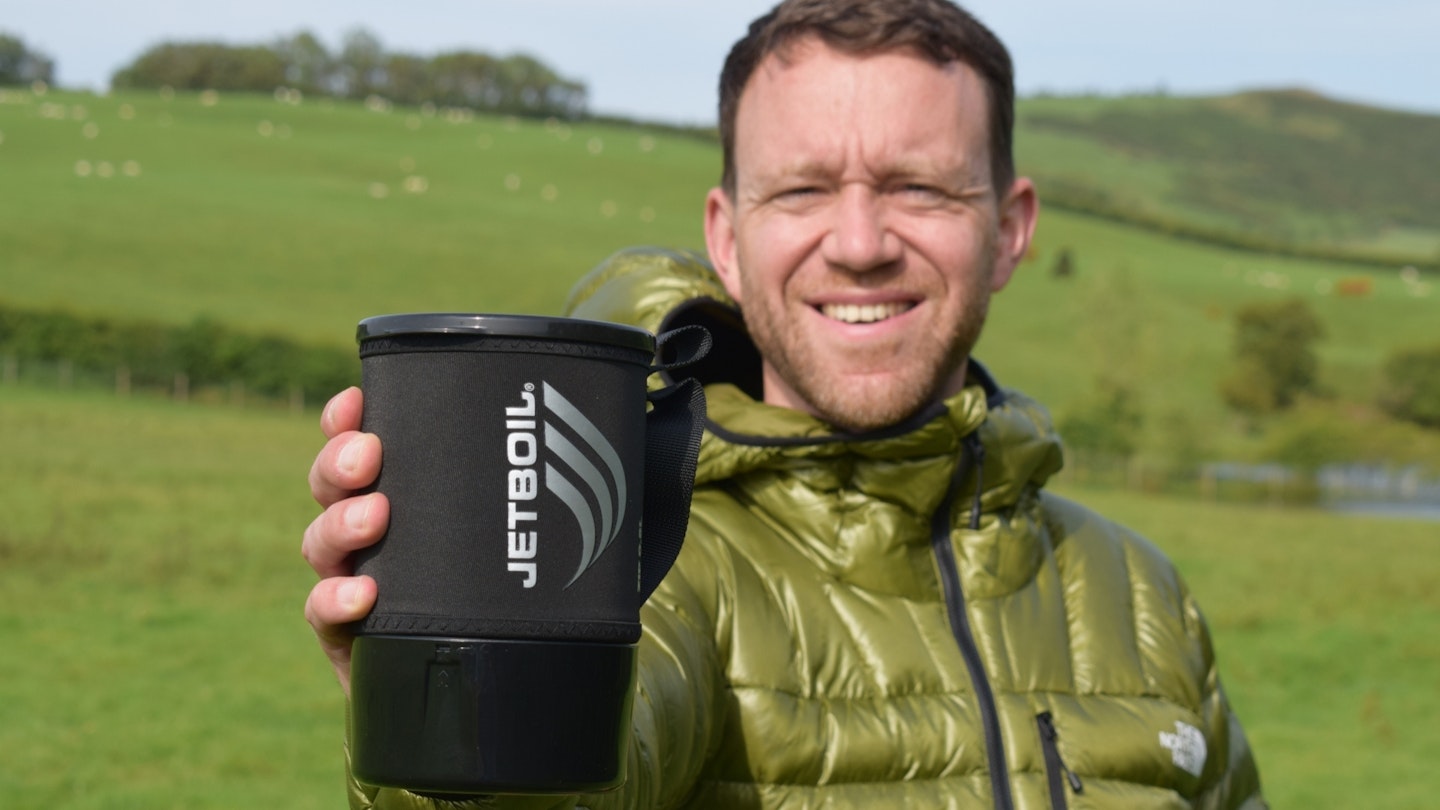
The plastic cup slots neatly over the FluxRing base of the pot for storage, and doubles as a 300ml drinking vessel or measuring bowl. It’s perfect for your morning brew and means you can leave a dedicated camping mug at home – a handy little weight-saver.
The stabiliser base clips to the bottom of your gas canister, with three legs and angled slots that grip 100g and 230g canisters securely. It’s a small but essential bit of kit that gives the whole setup a much more stable footprint, especially on uneven ground.
Finally, the pot itself is wrapped in JetBoil’s 'insulating cosy' – a tough, neoprene-style sleeve with a webbing handle. This makes it far easier to lift the pot on and off the burner or sip directly from it without burning your fingers. It also gives the system a more usable, mug-like feel – ideal when you’re slurping hot soup, brewing up or pouring boiling water into your expedition meal pouch.
Price and performance
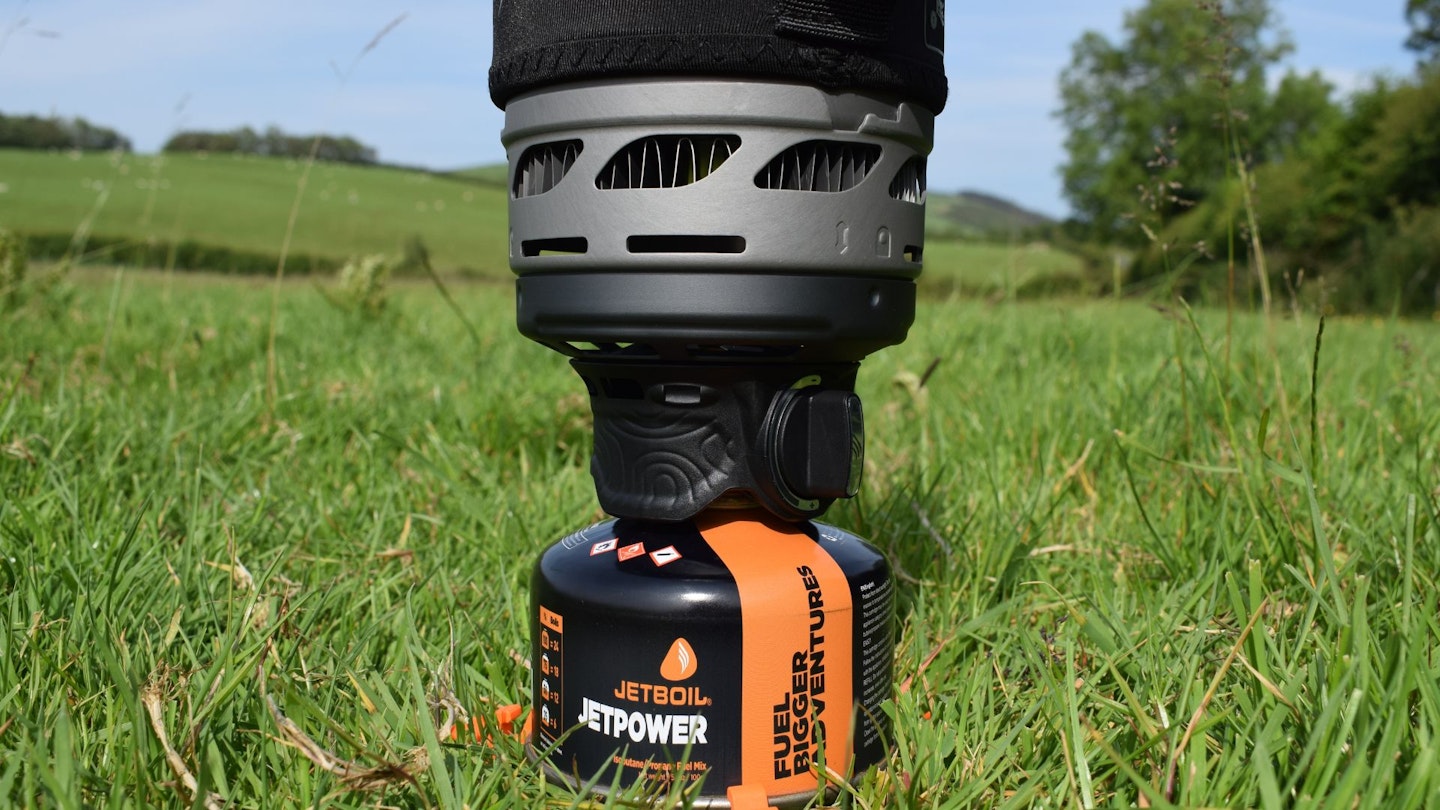
In my opinion, the JetBoil Zip hits a real Goldilocks sweet spot – especially if you’re specifically looking for an all-in-one integrated stove system. It’s lightning fast at boiling water (just 1min 45secs for 500ml in my test), it’s lighter and more compact than many rivals, and crucially, it’s one of the most affordable integrated systems on the market.
For solo backpackers, it really hits the mark. For couples or those wanting to boil bigger volumes, it might be worth spending the extra £30 for the JetBoil Flash 2.0 (£149.99), but the Zip still strikes a very appealing balance between weight, performance, and price.
It's strongly recommended – with the only proviso being that if you’re trying to save cash, you could look at Fire Maple's stove systems, which come in at around half the price (albeit with a less refined design, slightly lower performance and questions over long-term durability).
Or, for true minimalists, a basic canister-top stove and a simple pot will always be the most budget-friendly route. That said, the JetBoil Zip is a first-rate option for most campers.
Verdict
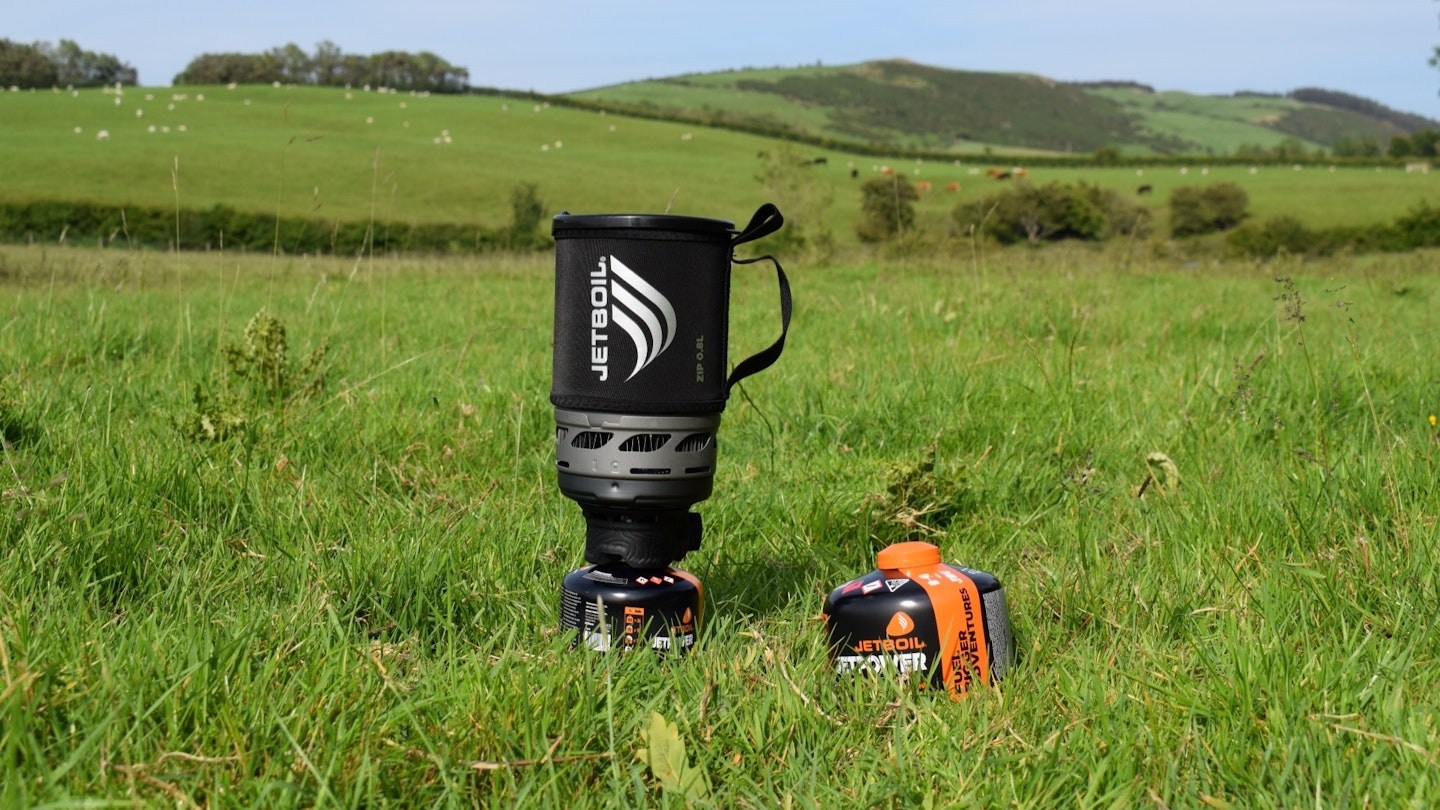
The Jetboil Zip is a rapidly powerful all-in-one stove system at a pretty decent price – but it’s not designed for more complicated cooking techniques beyond just boiling water.
See how the Jetboil Zip compares with other highly-rated backpacking stoves.
Shop this product
About the author

James Forrest writes regular features and route guides for Trail and LFTO, and has been one of our main gear testers for the last few years. James is based on the edge of the Lake District so when he isn’t off on his latest crazy adventure or challenge, he’s walking in his local fells.



